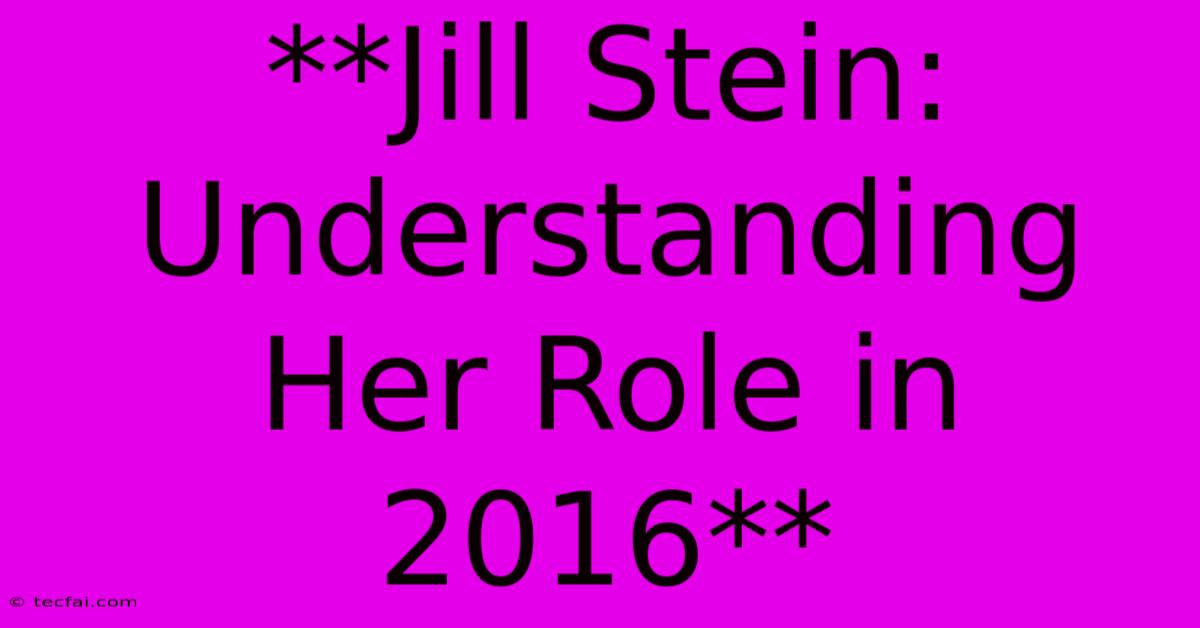**Jill Stein: Understanding Her Role In 2016**

Discover more detailed and exciting information on our website. Click the link below to start your adventure: Visit Best Website tecfai.com. Don't miss out!
Table of Contents
Jill Stein: Understanding Her Role in 2016
The 2016 US Presidential election was a pivotal moment in American history, and Jill Stein, the Green Party candidate, played a controversial role in its outcome. While she garnered a small percentage of the vote, her candidacy sparked debates about the role of third-party candidates, the impact of voter dissatisfaction, and the complexities of American electoral politics.
Who is Jill Stein?
Jill Stein is a physician, activist, and politician known for her progressive views. She ran for President in 2012 and 2016, representing the Green Party. Her campaign platform focused on environmental protection, social justice, and economic equality. Stein's strong stance against corporate influence and her advocacy for issues like single-payer healthcare, tuition-free college, and a transition to renewable energy resonated with many disenchanted voters.
Stein's Role in the 2016 Election
Despite her limited electoral success, Stein's campaign had a significant impact on the 2016 election:
- Third-Party Influence: While Stein received only 1.07% of the popular vote, her candidacy drew attention to the increasing dissatisfaction with the two major parties. Some argue that her presence in the race diverted votes that could have gone to Hillary Clinton, potentially impacting the outcome of the election in key swing states.
- Voter Dissatisfaction: Stein's campaign tapped into a growing sense of frustration with the political establishment and the perceived corruption of both major parties. Her focus on issues like corporate greed, social inequality, and environmental degradation resonated with voters who felt ignored by the mainstream candidates.
- The Rise of Alternative Politics: The success of Bernie Sanders' progressive campaign, coupled with Stein's candidacy, signaled a growing desire for political alternatives outside of the traditional two-party system. It sparked conversations about the need for greater representation of diverse political ideologies in American politics.
Controversy and Criticism
Stein's campaign was not without controversy. She faced criticism for:
- Potential to Spoil the Election: Some argued that Stein's candidacy played a role in Donald Trump's victory, potentially "spoiling" the election by siphoning votes away from Hillary Clinton.
- Lack of Realistic Policy Proposals: Critics questioned the feasibility of some of her campaign promises, such as a rapid transition to 100% renewable energy.
- Conspiracy Theories: Stein's vocal skepticism of election integrity and her promotion of unsubstantiated claims about voter fraud fueled criticism and accusations of spreading misinformation.
Legacy and Lasting Impact
Jill Stein's 2016 presidential campaign continues to spark debate about the role of third-party candidates and the future of American politics. Her candidacy highlighted the growing dissatisfaction with the two-party system and the need for a more diverse range of political options. While her electoral success was limited, Stein's campaign raised important questions about the state of American democracy and the desire for political alternatives that address the concerns of disenchanted voters.
Keywords: Jill Stein, 2016 election, Green Party, third-party candidate, voter dissatisfaction, alternative politics, progressive politics, presidential election, US politics, election controversy, conspiracy theories, election integrity, impact on election outcome, political reform, political change.

Thank you for visiting our website wich cover about **Jill Stein: Understanding Her Role In 2016** . We hope the information provided has been useful to you. Feel free to contact us if you have any questions or need further assistance. See you next time and dont miss to bookmark.
Featured Posts
-
2016 Nyc Voting Photo Donald Trump
Nov 06, 2024
-
Ap Election Calls The Analog Process
Nov 06, 2024
-
Steelers Add Wide Receiver Mike Williams In Trade
Nov 06, 2024
-
Embiids Frustration Sixers Under Pressure
Nov 06, 2024
-
Uk Confirms Two Mpox Cases Clade Ib
Nov 06, 2024
